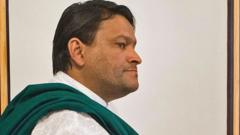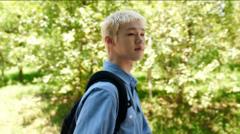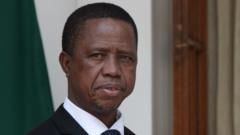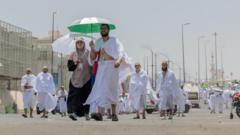The recent murder of Muhsin Hendricks, the first openly gay imam, has ignited fears and calls for unity within the LGBTQ+ community in South Africa. While religious leaders condemned the act, Hendricks' supporters vow to continue his legacy of advocacy for acceptance and equality.
Legacy of an Openly Gay Imam: A Call for Change in the Face of Tragedy

Legacy of an Openly Gay Imam: A Call for Change in the Face of Tragedy
The assassination of Muhsin Hendricks, a trailblazer for LGBTQ+ rights within Islam, sparks renewed determination among advocates in South Africa.
The execution-style killing of Muhsin Hendricks, the first openly gay imam in South Africa, has sent shockwaves through the LGBTQ+ community, igniting fears for safety while simultaneously fueling momentum for change in religious acceptance. Reverend Toni Kruger-Ayebazibwe praised Hendricks as a "gentle spirit" who illuminated the lives of those around him, expressing the profound sense of loss felt by queer Muslims globally.
Hendricks, 57, was gunned down in Gqeberha, where initial reports mischaracterized his visit as one to officiate a gay wedding. In reality, he was there to oversee the nuptials of two interfaith heterosexual couples, marking a significant challenge to traditional Islamic practices. His willingness to perform such ceremonies, which traditional imams typically avoid, highlights the trailblazing nature of his life.
South Africa is lauded for being the first African nation to legalize same-sex marriage in 2006 and boasts a vibrant LGBTQ+ community. However, Hendricks faced condemnation from established religious leaders who view same-sex relations as inconsistent with Islam. The Muslim Judicial Council and the United Ulama Council of South Africa denounced his murder, despite previously labeling him simply as "Mr. Hendricks" rather than employing honorifics.
Hendricks transitioned from a heterosexual marriage to coming out as gay in 1996, subsequently marrying a Hindu man and establishing The Inner Circle, a support group for queer Muslims. His actions were revolutionary, enabling many to reconcile their faith with their sexual identities.
Despite the relative progress of LGBTQ+ rights, stigma and violence persist within South African society, amplified by traditional religious conservatism. Reverend Ecclesia de Lange acknowledged how even progressive faith groups grapple with deeply ingrained traditional views.
In the wake of Hendricks' death, reactions on social media have been distressing, sparking further anxiety among those contemplating openness about their identities. Dr. Fatima Essop expressed horror at the vitriol, emphasizing the teachings of compassion within Islam and condemning violence against any individual.
Although the motives behind Hendricks' assassination remain unclear, his passing has prompted calls for enhanced security among LGBTQ+ leaders. Yet, Reverend Kruger-Ayebazibwe emphasizes that such violence will not quench their spirit to advocate for change.
His burial occurred in private, but the Al-Gurbaah Foundation plans to hold a memorial honoring Hendricks' pivotal contributions to society. Teboho Klaas from The Other Foundation asserted that although his life was taken, his legacy continues to thrive in the hearts and efforts of those he inspired.





















